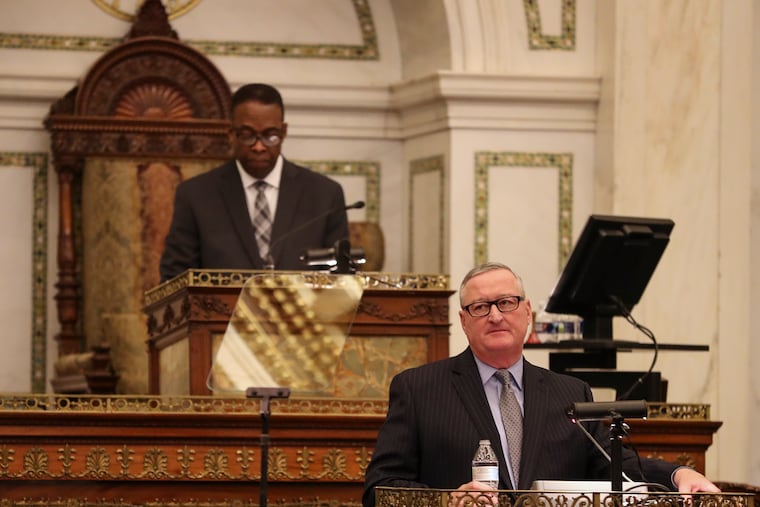Tuition-free community college will make Philly stronger | Opinion
Mayor Jim Kenney's proposal to cover tuition and other costs at the Community College of Philadelphia will open doors for thousands in the city.

Philadelphia doesn’t have enough college graduates, and it’s holding the city back.
If Philadelphia had more people with associate and bachelor’s degrees, we’d attract more companies to start here and stay here. More importantly, low-income Philadelphians could move into the middle class.
Why is a college degree still seen as a luxury item out of reach for most city residents?
Cost.
Students — especially those living near the poverty line — need money to cover the costs of tuition and fees. And they need money to pay for books, transportation, child care, food, housing, and other living expenses. This cascade of costs can keep students from enrolling and derail students before they can earn a degree.
Mayor Jim Kenney’s proposed scholarship program for the Community College of Philadelphia would directly address these hurdles, offering students from low- and moderate-income families last-dollar tuition support, which will cover any costs not accounted for by other aid. The proposal draws from best practices that are being adopted in communities as diverse as New York City and rural Tennessee.
If enacted, it can begin to give those Philadelphians who have traditionally been excluded from college the chance at earning a degree.
Why do we need this?
College costs in Pennsylvania have exploded in the last decade. According to a recent diagnosis, Pennsylvania ranks 49th of 50 states in college affordability. And as in nearly all other states, college in Pennsylvania has become less affordable since 2008.
While students could once work their way through college, that’s no longer the case. Even to attend community college, a student earning Pennsylvania minimum wage would have to work more than 26 hours a week to pay tuition, before considering life expenses like food and housing. Working 20 or more hours per week while also taking classes can be harmful to students’ grades and ability to stay enrolled.
Students who borrow money to enroll in college but don’t graduate wind up in a worse place than where they started. This debt can be crushing, especially for black families. About 85% of black students graduating with bachelor’s degrees and 67% of black students graduating with associate degrees take out loans, according to federal data.
The Community College of Philadelphia is a smart place for the Kenney administration to focus its energies. CCP can arm learners with associate degrees that ready them to enter the workforce — and put them on a path to bachelor’s and professional degrees. The school also offers dual enrollment programs with a number of high schools in the city, giving young Philadelphians a jump start on a degree.
What would be successful here? Let’s start with what has worked elsewhere.
One inspiration for Kenney’s proposal is the City University of New York’s Accelerated Study in Associate Programs (ASAP). According to CUNY, 61% of ASAP students earned associate degrees, compared with 37% of non-ASAP students, and ASAP students earned those degrees significantly faster. They were 10 percentage points more likely to enroll in a baccalaureate program. And they were 20 percentage points more likely to earn a degree within six years.
Under Kenney’s proposal, like under ASAP, students would receive enhanced services from a team of coaches, navigators, and academic advisers with the goal of increasing graduation, enrollment, and persistence.
This support is crucial. But so is a dedicated funding source for the program. As the mayor and City Council go to work on the details, they should make sure the final product can be sustainable.
Tennessee Promise, which provides financial support to attend community or technical college, has changed lives in that state, with about a 5% increase in college-going students. The program was launched in a Republican-controlled state and has a dedicated funding source with the Tennessee Promise Endowment. Programs like Oregon Promise, which rely on annual appropriations, are less secure.
Many Philadelphians see the city’s story over the last 20 years as one of growth and success. To take the next step, and to make sure all our residents can be part of this growth, we need more college graduates.
Mayor Kenney’s proposal puts us on that track.
Laura Perna is a professor of higher education at the University of Pennsylvania Graduate School of Education and the codirector of Penn AHEAD (Alliance for Higher Education and Democracy).